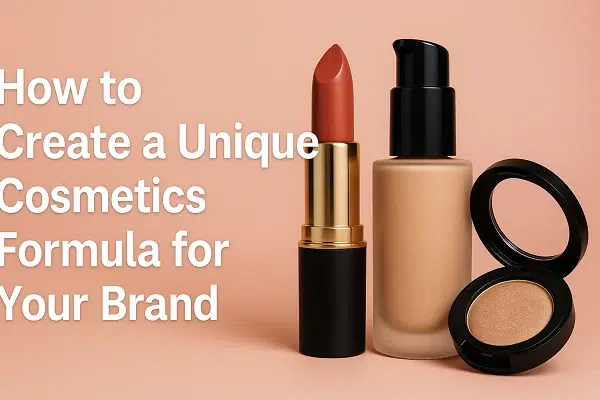In this article, we’ll look at the key differences between private label cosmetics and branded goods and help you decide which is best for you. From cost and quality to branding and personalization, let’s delve into the world of beauty products and uncover the advantages and disadvantages of each type.
Cosmetics have been around for decades, with people using them to improve their looks and boost their confidence.
However, with a wide range of cosmetic products available today, it can be challenging to know which ones are worth spending in. One of the most important decisions that customers must make is whether to purchase private label makeup or branded products. While both types of products have advantages, they vary significantly.
What Are Private Label Cosmetics?
Private label cosmetics are skincare products that are created under your brand name by a third-party manufacturer. As a consumer, you get to choose everything about the product, including the product’s packaging, its formula, and the design of the label.
You simply pay for the products to be manufactured. After that, you can either offer the product directly to a customer or to other wholesalers under your brand name.
What Are The Benefits Of Private Label Cosmetics?
Improve brands equity
Private label cosmetics have a distinctive brand that is particular to the supplier. A new customer will always recall the name of the store if the brands are identical. This strengthens the company brand.
A business can easily expand its supply in order to satisfy consumer desire
They can offer more goods because of low prices. When customers who are price cautious or disloyal see a desirable product, they are apt to purchase it.
Control over pricing
The business owner has more freedom to choose the selling price. They identify suitable producers after determining the costs and product specifications.
Marketing independence
Manufacturers do not have to pay for promotion expenses. Additionally, they use cooperation agreements to ensure future revenue. Their only responsibility is to ensure that the product complies with the owner’s requirements.
Disadvantages Of Private Label Cosmetics
Minimum order
Private label producers always request minimum purchase. This implies that you may have to buy more goods than you actually need. This can raise your expenses on stock and sag your capital.
Low quality perception
With the lower cost of private label cosmetics, a customer might think that such goods are of lower grade. This can damage the reputation of a company. Also, it has an enormous impact on other products of the vendor.
Production dependency
Since you rely on a third-party company to manufacture your goods, the product’s launch date may be delayed when you wait for the manufacturer to complete production.
What Are Branded Products?
Branded cosmetics are products that are marketed and sold by stores under their own naming, but they are actually made by a different company. They are generic and distributed to numerous retailers, who brand and set prices based on the target audience.
The main advantage is that one company can focus on manufacturing the product, another on promoting it, and another on selling it, depending on their skills and preferences. It saves businesses time, energy, and money in terms of manufacturing and advertising the product.
What Are The Benefits Of Branded Products?
Budget friendly
Branded products are less expensive since you only need to purchase the right product and brand it. You will not have to worry about evaluation, certifications, or any other costs associated with producing a product because the manufacturer will always take care of it.
Risk-free
Branded products are carefully crafted and comply with all industry standards and country laws. Since the goods have already been tested, you can always be sure that they will satisfy the needs of your customer.
High-quality
With branded products, it’s a guarantee that your business will stand out since you can successfully brand a product that has been created by a company known for its high standards.
Time-effective
Branded cosmetic products business is a quick and easy process because you don’t have to wait for the supplier to manufacture or evaluate goods.
Disadvantages Of Branded Products
Tied to a Producer
Once you’ve decided to partner with a manufacturer and started selling your brand of cosmetics, it may be challenging to switch manufacturers without altering the goods themselves. You might have trouble locating a comparable product elsewhere if, for whatever cause, you are no longer able to deal with a particular manufacturer.
No control over product content
While you are allowed to brand the product with your unique business logo and design, you are not allowed to change the composition of the product. The product quality can therefore resemble some products in the market.
Limited choices
Since the goods cannot be formulated, your options may be limited based on the producer and the product you select.
What Are The Key Elements Of Products Branding?
Logo for brand recognition
Your business logo is one of the most recognized elements of your company as it identifies your brand. The logo design can be either basic or detail-oriented; there is no set standard.
Always ensure that your logo is strong enough to reflect your entire brand because product marketing will include pertinent messaging and features based on visual clarity. The brand type must be conveyed through color, logo, scheme, or fonts.
Brand Name
A brand name is a phrase that describes your business to the public and the products or services you provide, setting you apart from your rivals.
The brand name needs to support the industry services and business you are in. There should be a reasonable degree of familiarity with the brand in order to prevent potential customers from becoming confused.
Packaging Designs
Customers’ first impressions and experiences with your business will be formed solely by the packaging, which conveys the industry brand’s narrative.
Packaging needs to have the right logo components to support your product’s great quality, such as a logo, statement, typography, fonts, and images. To attract your valued consumers, you must align stock designs and packaging with your company values.
What Are The 6 Key Differences Between Private Label Products And Branded Products?
Below are the main differences that you must understand in order to determine the best procedures for the various goods that you’re selling.
Unique features and quality
Private label goods usually have distinctive qualities. Any unique features of a new product range can always be highlighted with the aid of a private label. For this reason, new businesses that sell goods with uncommon or extra components might opt to use private labeling.
Printing and marketing efforts
Branded product sellers must use more innovative marketing strategies. Since the same generic goods are sold by numerous stores, these businesses have to devise design strategies or marketing campaigns. It’s only through new advertising strategies that resellers’ goods will stand out from those of rivals.
Supply
Branded products allow businesses to expand the distribution of their beauty lines. Several similar stores already have a huge online presence, along with customers who trust their procedures. New sellers can easily increase the visibility and sales of their goods by branding them.
Consumer budget
Price-wise, private label goods are usually more expensive than branded goods. Customers who buy private label products do so because they are exclusive to that store, which means that they have special features that are not found in competing products. Again generic goods are easier for customers to locate elsewhere because they are sold by numerous stores.
Speed of selling goods
Items sold when branded may sell quicker than those with private labels. Consumers normally trust huge retail organizations, so they’re more eager to test out new organic items with that firm’s corporate name. If a vendor wants to market its new beauty line as rapidly as possible, branded products can be the right solution.
Product line modification
Private labels give sellers the freedom to alter their product line. For instance, a store that buys a brand of pinnacle cosmetics with a private name may change the packing or the colors of the product. On the other hand, branded products prohibit stores from changing product lines from another business. With a white label, sellers can only alter the product’s name and not the actual product itself.
Deciding Which Is Right For You: Private Label Cosmetics Vs. Branded Products
Choosing which one is right between private label cosmetics and branded products is greatly determined by your goals.
When should you choose private label cosmetics?
· Choose a private label if you need to control the specifications of the item and quality in order to market a unique product.
· Select private labeling if you need to own the product and change the pricing.
· Choose private labeling if you want to build a brand and offer promotional products that compete effectively in the market.
· Go for product labeling if you are ready to swiftly meet the requirements and preferences of the consumers. Most consumers prefer uniqueness and consistency.
When should you choose branded products?
· Choose branded products if you want to launch an industry with a low startup cost.
· Go for branded products if you are ready to rely on the production knowledge of the producer and promote the exposure of your business.
· Select branded products if you want to start selling a product right away but lack an original product concept.
· Choose branded products if you are not ready to control your product’s specifications.
How To Select Private Label Cosmetics And Start Selling
There are a few factors that you need to consider before starting your new private labeling business. Let’s examine the basics.
Identify a niche market
The first step is to explore various niche marketplaces within different categories to determine exactly what you want to offer. Some of the categories include baby products and health products.
When selling to a specialized market, you can use extremely focused marketing techniques to spread information about your enterprise and goods.
Find private label producer
Once you’ve decided what you want to offer, your next move should be to search for reputable suppliers of the chosen item.
Create a list of reputable producers and contact them. As you must decide whether to retain the stock or establish a prepaid account with the supplier, be sure to find out if the supplier has a minimum order value.
Purchase samples
Before making the goods accessible for buying, it is crucial to try them yourself. Doing your research and testing using the samples will help you in ensuring that the goods fit your standards and goals.
Create your online shop
Now that your goods and producer are in place, it’s time to launch your online shop. You can select and modify both free and premium templates with e-commerce platforms such as Shopify.
After creating your webshop, you can search for the in-built e-commerce applications you require to run your private label firm. You can then add products and start delivering.
Start and promote your shop
If you want to generate more revenue, you must research and increase visibility and visitors to your website. Paid promotions on websites like Google and media platforms are a fantastic method to spread information about new businesses. Then, you can add organic promotions and gradually expand them over time.
Conclusion
In summary, the decision between branded goods and private label cosmetics eventually comes down to objectives and personal taste. While branded goods may give status and confidence, private label cosmetics may provide affordability and adaptability. You must take into account both options and provide a variety of choices to satisfy the requirements of their varied customer base as customers become more discerning and knowledgeable. Finding makeup that makes you feel confident and attractive is what counts most, regardless of whether you favor private label or labeled goods.







